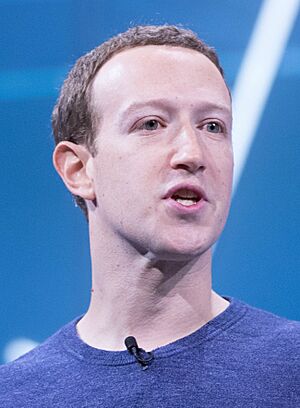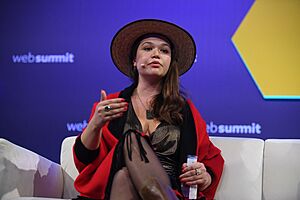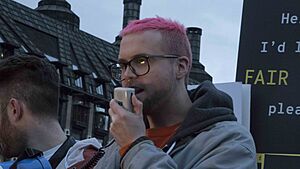Facebook–Cambridge Analytica data scandal facts for kids
In the 2010s, a company called Cambridge Analytica collected personal information from millions of Facebook users. They did this without people's permission. This data was mostly used to help with political campaigns.
The information was gathered using an app called "This Is Your Digital Life." A scientist named Aleksandr Kogan and his company made this app in 2013. The app asked users questions to create "psychological profiles" about them. It also collected information from the Facebook friends of the people who used the app. This happened through Facebook's Open Graph platform. The app ended up getting data from about 87 million Facebook profiles.
Cambridge Analytica used this data to help the 2016 presidential campaigns of Ted Cruz and Donald Trump. The company was also thought to have influenced the Brexit referendum in the UK. However, an official investigation found that Cambridge Analytica was not deeply involved and no major rules were broken there.
In 2018, a former Cambridge Analytica employee, Christopher Wylie, told The Guardian and The New York Times about the data misuse. After this, Facebook said sorry for its part in collecting the data. Facebook's CEO, Mark Zuckerberg, even spoke in front of the U.S. Congress. In July 2019, Facebook was fined $5 billion by the Federal Trade Commission for not protecting people's privacy. In October 2019, Facebook also agreed to pay a £500,000 fine to the UK Information Commissioner's Office. This was because user data was put at "serious risk of harm." In May 2018, Cambridge Analytica closed down.
Other advertising groups had used similar ways of targeting people based on their psychology for years. Facebook itself had even patented a similar technology in 2012. However, Cambridge Analytica's methods and its famous clients, like the Trump campaign and the UK's Leave.EU campaign, made people more aware of these issues. The scandal made the public more interested in privacy and how social media affects politics. An online movement called #DeleteFacebook became popular on Twitter.
Contents
How the Data Was Collected
Aleksandr Kogan, a data scientist, was hired by Cambridge Analytica. This company was connected to another group called SCL Group. Kogan created the app "This Is Your Digital Life."
Cambridge Analytica then set up a study where hundreds of thousands of Facebook users agreed to take a survey for money. They were told the survey was only for school research. But Facebook allowed this app to collect not just the information of the people taking the survey, but also their Facebook friends' information. This is how Cambridge Analytica got data from millions of Facebook users.
Journalists first reported on Cambridge Analytica collecting personal data in December 2015. They said the company was working for U.S. Senator Ted Cruz. They were using data from millions of Facebook accounts without permission. More reports came out in 2016 and 2017 from different news sources.
The data problem became widely known in March 2018. This was when Christopher Wylie, a former Cambridge Analytica employee, came forward. He had been a secret source for a news article in 2017. Wylie worked with a journalist for a year before deciding to speak out publicly.
The Guardian and The New York Times published articles about the issue on the same day, March 17, 2018. Facebook's value dropped by over $100 billion in just a few days. Leaders in the U.S. and UK demanded answers from Facebook CEO Mark Zuckerberg. The public reaction led to him agreeing to speak in front of the United States Congress.
What Data Was Collected
How Many People Were Affected
News reports first said that the data included information on 50 million Facebook users. Cambridge Analytica claimed it only collected 30 million profiles. However, Facebook later confirmed that data from potentially over 87 million users was involved. About 70.6 million of these people were from the United States.
Facebook thought that California was the U.S. state most affected, with 6.7 million users. Next were Texas with 5.6 million, and Florida with 4.3 million. Data was collected from at least 30 million users, even though only 270,000 people downloaded the app.
What Information Was Gathered
Facebook sent messages to users who might have been affected. They said the information likely included things like a person's "public profile, page likes, birthday and current city." Some users of the app gave it permission to see their News Feed, timeline, and messages.
The data was detailed enough for Cambridge Analytica to create psychographic profiles of people. This means they could understand people's personalities and interests. The data also included where each person lived. For a political campaign, this information could suggest what kind of advertisement would best convince a person in a certain place for a political event.
How the Data Was Used
Ted Cruz's Campaign
In 2016, U.S. Senator Ted Cruz hired Cambridge Analytica to help his presidential campaign. Records show that Cruz paid the company $5.8 million for its services. At that time, Cambridge Analytica was not very well known. This is when the company started to create individual psychological profiles. This data was then used to make special advertisements for each person. The goal was to persuade them to vote for Cruz.
Donald Trump's Campaign
Donald Trump's 2016 presidential campaign used the collected data. They built psychographic profiles to figure out users' personality traits from their Facebook activity. The campaign team used this information for "micro-targeting." This meant showing different U.S. voters customized messages about Trump on various online platforms.
Ads were sorted into groups. This was mainly based on whether people supported Trump or were undecided voters (called swing votes). Cambridge Analytica's CEO explained that the main goal was to find people who might be convinced to vote for their client or discouraged from voting for the opponent. Trump supporters saw positive images of him and information about voting places. Undecided voters were often shown pictures of Trump's well-known supporters. They also saw negative images or ideas about his opponent, Hillary Clinton. For example, the data was used by a group called "Make America Number 1 Super PAC." They created ads that attacked Clinton, saying she was corrupt. This was meant to make Trump look like a better choice for president.
However, a former Cambridge Analytica employee, Brittany Kaiser, was asked if it was fully proven that the Trump campaign used the Facebook data that was gotten without permission. She said it had not been proven. She explained that it would need a deep look into the database to prove it.
Other Reported Uses
Russia
In 2018, the Parliament of the United Kingdom asked Alexander Nix, a director at SCL Group, about Cambridge Analytica's links with a Russian oil company, Lukoil. Nix said he had no connections to these companies. However, there were worries that the oil company was interested in how Cambridge Analytica's data was used to target American voters. Later, Christopher Wylie confirmed that Lukoil was interested in the company's data for political targeting.
Brexit
Cambridge Analytica was reportedly hired to advise Leave.EU and the UK Independence Party in 2016. This was to help convince people to support Brexit. These rumors came from internal emails that were shared with the British parliament. Brittany Kaiser said that the data sets Leave.EU used were given by Cambridge Analytica. These data sets, made from Facebook data, were said to be part of an early job for them.
Even though Arron Banks, a co-founder of Leave.EU, first said they had no involvement with the company, he later said, "When we said we'd hired Cambridge Analytica, maybe a better choice of words could have been deployed." An official investigation by the UK Information Commissioner found that Cambridge Analytica was not involved "beyond some initial enquiries." The regulator did not find any "significant breaches" of data protection rules that needed formal action.
Responses to the Scandal
From Facebook and Other Companies
Facebook CEO Mark Zuckerberg first apologized for the situation with Cambridge Analytica on CNN. He called it an "issue," a "mistake," and a "breach of trust." He said he was responding to Facebook users' worries. He explained that the company's focus had changed from sharing data easily to protecting it more strictly. He also reminded users of their right of access to personal data. Other Facebook officials argued against calling it a "data breach." They said that people who took the personality quiz had agreed to share their information.
Zuckerberg promised to make changes to Facebook's rules to stop similar problems. On March 25, 2018, Zuckerberg published a personal letter in various newspapers, apologizing for Facebook. In April, Facebook decided to use the EU's General Data Protection Regulation (GDPR) in all its operations, not just in the EU.
In April 2018, Facebook created Social Science One as a response to the event. On April 25, 2018, Facebook released its first earnings report since the scandal. Revenue went down from the previous quarter, which is normal after the holiday season. However, that quarter's revenue was the highest for a first quarter and the second highest overall.
Amazon said they stopped Cambridge Analytica from using their Amazon Web Services in 2015. This was when they learned that Cambridge Analytica was collecting personal information. The Italian bank UniCredit stopped advertising on Facebook in August 2018.
From Governments
The governments of India and Brazil asked Cambridge Analytica to report how data from the breach was used in political campaigns. Also, various local governments in the United States have lawsuits from citizens affected by the data breach.
In early July 2018, the United Kingdom's Information Commissioner's Office announced it planned to fine Facebook £500,000 ($663,000). This was the largest fine allowed at the time of the breach. They said Facebook "broke the law by failing to protect people's information."
In March 2019, a court document from the U.S. Attorney General for the District of Columbia claimed that Facebook knew about Cambridge Analytica's "improper data-gathering practices" months before they were first reported in December 2015.
In July 2019, the Federal Trade Commission (FTC) voted to fine Facebook $5 billion to settle the investigation into the data breach. This record-breaking settlement was one of the largest fines ever given by the U.S. government for any violation. The FTC said Facebook kept breaking privacy rules from 2012. These rules included sharing users' data with apps used by their friends, having facial recognition on by default, and Facebook using user phone numbers for advertising. As a result, Facebook had to follow a new 20-year settlement order.
Also in July 2019, the FTC sued Cambridge Analytica's CEO Alexander Nix and the app developer Aleksandr Kogan. Both agreed to orders that limit their future business dealings. They also agreed to destroy any personal data they collected and any work made from that data. The app first collected information from up to 270,000 users. Then, it gathered data from up to 65 million Facebook friends. Cambridge Analytica went out of business.
Again in July 2019, Facebook agreed to pay $100 million to settle with the U.S. Securities and Exchange Commission. This was for "misleading investors about the risks it faced from misuse of user data." The SEC said Facebook did not correct its information for more than two years, even though it found out about the misuse of user information in 2015.
Impact on Facebook Users
Since April 2018, the first full month after the Cambridge Analytica data breach news broke, the number of likes, posts, and shares on Facebook went down by almost 20%. This activity has continued to decrease, only going up briefly in the summer and during the 2018 U.S. midterm elections. Despite this, the number of Facebook users grew by 1.8% in the last part of 2018.
On March 26, 2018, about a week after the story was first published, Facebook stock fell by about 24%. This was equal to $134 billion. By May 10, Wall Street reported that the company had gotten back its losses.
#DeleteFacebook Movement
The public reacted to the data privacy breach by starting the #DeleteFacebook campaign. The goal was to encourage people to stop using Facebook. The co-founder of WhatsApp, which Facebook owns, even joined the movement. The hashtag was tweeted almost 400,000 times on Twitter within 30 days after the news broke. About 93% of the times the hashtag was mentioned were on Twitter, making it the main platform for sharing it.
However, a survey found that even though about 84% of Facebook users were worried about how the app used their data, about 48% of those surveyed said they would not actually use the social media network less. Also, in 2018, Mark Zuckerberg said he did not think the company had seen "a meaningful number of people act" on deleting Facebook.
Another campaign and hashtag, #OwnYourData, was started by Brittany Kaiser. This hashtag was created by Kaiser as a Facebook campaign that pushed for more openness on the platform. #OwnYourData was also used in Kaiser's request for Facebook to change its rules. She wanted to give users more power and control over their data, which she called users' "assets" and "property." Besides the hashtag, Kaiser also created the Own Your Data Foundation. This foundation aims to promote better digital education.
The Great Hack Documentary
The Facebook–Cambridge Analytica data scandal was also covered in a 2019 Netflix documentary called The Great Hack. This was the first full-length film that connected the different parts of the scandal into one story. The documentary provides background information and events related to Cambridge Analytica, Facebook, and the 2016 election that led to the data scandal. The Great Hack shares the experiences of several people who were involved in the event in different ways. These people include David Carroll and Brittany Kaiser. David Carroll is a professor who tried to use the legal system to find out what data Cambridge Analytica had about him. Brittany Kaiser is a former Cambridge Analytica employee who became a whistleblower for the data scandal.
Expert Opinions and Testimonies
The U.S. Senate Judiciary Committee asked people to speak about the data breach and general data privacy. They held two hearings. One focused on Facebook's role in the breach and privacy on social media. The other was about Cambridge Analytica's role and its impact on data privacy. The first hearing was on April 10, 2018, where Mark Zuckerberg spoke. The second was on May 16, 2018, where Professor Eitan Hersh, Dr. Mark Jamison, and Christopher Wylie spoke.
Mark Zuckerberg's Testimony
During his testimony to Congress on April 10, 2018, Zuckerberg said it was his personal mistake that he did not do enough to stop Facebook from being used for harm. He said, "That goes for fake news, foreign interference in elections and hate speech." During the testimony, Mark Zuckerberg publicly apologized for the breach of private data: "It was my mistake, and I’m sorry. I started Facebook, I run it, and I’m responsible for what happens here."
Zuckerberg explained that in 2013, Aleksandr Kogan created a personality quiz app. About 300,000 people installed it. The app was then able to get Facebook information, including that of the users' friends. Kogan obtained this data. Zuckerberg did not learn that this user information was shared by Kogan with Cambridge Analytica until 2015. Cambridge Analytica was then asked to delete all the data. Later, The Guardian, The New York Times, and Channel 4 found out that the data had not actually been deleted.
Christopher Wylie's Testimony
On May 16, 2018, Christopher Wylie, who is known as the "whistleblower" on Cambridge Analytica, also spoke to the U.S. Senate Judiciary Committee. He was the Director of Research at Cambridge Analytica in 2013 and 2014. He said he decided to speak out to "protect democratic institutions from rogue actors and hostile foreign interference, as well as ensure the safety of Americans online." He claimed that at Cambridge Analytica, "anything goes" and that Cambridge Analytica was "a corrupting force in the world." He explained to Congress how Cambridge Analytica used Facebook's data to put people into groups based on their political beliefs.
What Happened After
After Cambridge Analytica closed down, some related companies were started by people who used to work there. These included Emerdata Limited and Auspex International. At first, Julian Wheatland, the former CEO of Cambridge Analytica, said they did not plan to restart the two companies. Instead, the leaders and owners of Cambridge Analytica and its parent company, SCL Group, planned for them to be bought out because of bankruptcy and lawsuits. While employees went to new companies, Cambridge Analytica and SCL were bought by Emerdata Limited, a data processing company. Wheatland said that Emerdata would not get SCL companies' existing data or assets. He said this information belonged to the people in charge of the bankruptcy.
David Carroll, a professor who sued Cambridge Analytica, said that Emerdata was trying to hide the scandals and reduce further criticism. Carroll's lawyers argued that Cambridge Analytica's court administrators were acting illegally by selling off the company's assets before a full investigation. While these administrators fined SCL Group $26,000, a U.K. court denied Carroll's lawsuit. This allowed SCL to break apart without giving him his data.
In October 2021, after Facebook employee Frances Haugen spoke out as a whistleblower about Facebook's activities, NPR looked back at the Cambridge Analytica data scandal. They noted that Facebook did not take responsibility for its actions, and users did not see any benefits from reforms. In August 2022, Facebook agreed to settle a lawsuit seeking money in the case for an unknown amount. In December 2022, Meta Platforms (Facebook's parent company) agreed to pay $725 million to settle a group lawsuit. This lawsuit was about improperly sharing user data with Cambridge Analytica and other companies.
See Also
- AggregateIQ
- BeLeave
- The Great Hack, 2019 documentary film
- Russian interference in the 2016 Brexit referendum
- State-sponsored Internet propaganda
- Timeline of investigations into Trump and Russia (2019)
 | Percy Lavon Julian |
 | Katherine Johnson |
 | George Washington Carver |
 | Annie Easley |






